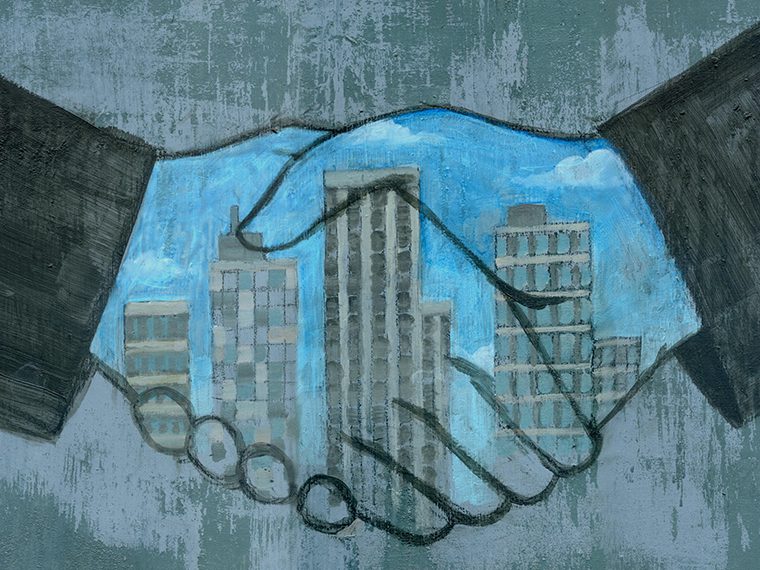Airbnb hosts seem to prosper more than Uber drivers
In the past decade, technology firms such as Uber and Airbnb have given rise to the concept of the “sharing economy.” To most consumers, a precise definition is unnecessary — they need a ride, a place to stay or some other good or service obtainable across a modern platform.
But economists and others studying the evolving sector might benefit from a granular, consistent definition in order to ask more rigorous research questions.
In a paper published in the Journal of Management Studies, Colorado State’s Gideon D. Markman, UCLA Anderson’s Marvin Lieberman, Ohio State’s Michael Leiblein, Hong Kong Baptist University’s Li-Qun Wei and the University of International Business and Economics’ Yonggui Wang propose a new definition that attempts to demarcate the sharing economy from the broader economy and distinguishes it with respect to “other forms of economic organization and resource orchestration.”
Opt In to the Review Monthly Email Update.
The Sharing Economy Has Evolved
In their definition, the sharing economy “entails multisided platforms that facilitate user access to — rather than ownership of — assets that are rivalrous in their use, and that are not owned by said platforms.”
The sharing aspect of some of these platforms may already be familiar to consumers: With Airbnb, people quite literally share their homes with strangers. But others, such as Expedia or the educational platform LinkedIn Learning, also fall under this new definition.
Some earlier analyses of the sharing economy broke it down into four categories, based on who the parties are in a given exchange facilitated by the platform:
- Person-to-person (P2P)
- Person-to-business (P2B)
- Business-to-person (B2P)
- Business-to-business (B2B)
However, the authors note, these categories may be less conceptually clarifying than focusing on “how and what”: “how platforms coalesce asset providers and users and what the conditions are under which temporary access to rivalrous assets is granted.”
The key distinction between today’s sharing platforms and earlier iterations of commercial matchmakers (such as headhunting firms, or taxi dispatchers) is how digital technology’s “low cost and broad reach dramatically facilitate[s] engagement and connections between users and providers of assets and labor services.”
Digital Technology Makes Sharing Economy More Accessible
The authors note several ways in which introduction of digital technology enables wider and easier participation in sharing economy transactions and can bring new participants into markets:
- The decoupling of labor and assets from enterprises, enabling more flexible and independent work
- Reducing transaction costs
- Creating trust through review systems
- Increasing access, for example, by making searches for lodging easy and customizable
- Increasing safety, for example, by using geolocation technology to track driver locations in a ride-sharing app
- Delivering nonprice benefits such as reducing downtime for drivers by more efficiently matching them with consumers, and alerting consumers when their ride is nearby so they don’t have to wait in the rain for a taxicab, for example
- Creating opportunities for “long-tail” providers and consumers outside of the platform’s core market “by luring engagement from parties (many of whom never engaged before) with more opportunities, options and control to monetize their assets (some of which were never monetized before)”
The authors analyze Uber and Airbnb, using their definition, to better understand the precise sources of value creation and noneconomic benefits. They then seek to understand how the design of the Uber and Airbnb platforms affects the way value is created and distributed among the relevant asset providers, platform designers and users.
By one estimate, Uber generates $6.76 billion annually in total value to U.S. consumers, an amount known as “consumer surplus,” which the authors note is an “extremely large” surplus. The company also had a market capitalization of nearly $74 billion in November 2021. But much of that shareholder value has gone to venture capital firms who invested in Uber and to its founders.
Who Benefits in a Sharing Economy Is a Complicated Answer
Evidence on the benefits to Uber drivers, on the other hand, has been more mixed; indeed, some drivers are waging legal battles to be reclassified as employees instead of as contractors. “Our assessment is that the enthusiasm for the platform has been significantly stronger from consumers than from Uber’s drivers,” the authors write. Conceptually, drivers, of course, are renting both their car and their own time in working for Uber. It’s a lot to recoup.

UBER Market Cap data by YCharts
Airbnb hosts, meanwhile, rent only the asset, their home or back bedroom (aside from some cleaning and administrative work). And they may be off at a high-salary job during the days their home is occupied. A different calculation entirely.
As of November 2021, Airbnb offered access to 5.6 million properties globally, a figure that exceeds “the combined room capacity of the six largest hotel groups,” the authors note. Who captures the value here? As with Uber, Airbnb “generates substantial nonprice benefits to consumers,” using technologically enabled features such as extensive photo galleries, user reviews, insurance protocols and differentiated offerings such as AirbnbLuxe. To many consumers, Airbnb has changed the nature of travel itself, lowering costs relative to hotels and placing travelers in neighborhoods and other areas once beyond their reach.
Perhaps because “prior to the platform’s launch the search costs for housing were too high, and the availability of such rentals was rather low” and because “a vacant apartment or house is significantly more wasteful than an unused car,” the authors conclude that “the amount of value that Airbnb can create by exploiting its assets is vastly greater than what Uber can create (all else being equal).” The value generated by Airbnb also appears to be distributed more evenly between users and asset providers, compared with Uber.
The differences in who-benefits-and-how come down to “the precise sources of value creation (types of assets and how the platform enhances their utilization) and the distribution of value among stakeholders (particularly, the degree to which asset providers capture benefits),” the authors note. Their definition can be combined with earlier methods of breaking down the sharing economy, such as who are the parties to the transactions, to yield new insights on how different types of users and providers influence the sources of value and stand to benefit from the distribution of that value.
The researchers are adamant that the sharing economy must not be seen as outside the bounds of the nonsharing economy. As they note, it has become “increasingly clear that the sharing economy is inseparable from the wider economic system.”
Featured Faculty
-
Marvin Lieberman
Harry and Elsa Kunin Chair in Business and Society; Professor of Strategy
About the Research
Leiblein, M., Lieberman, M., Markman, G., Wang, Y., Wei, L. (2021). The Distinctive Domain of the Sharing Economy: Definitions, Value Creation, and Implications for Research. Journal of Management Studies, 58(4), 927-948. https://doi.org/10.1111/joms.12707






